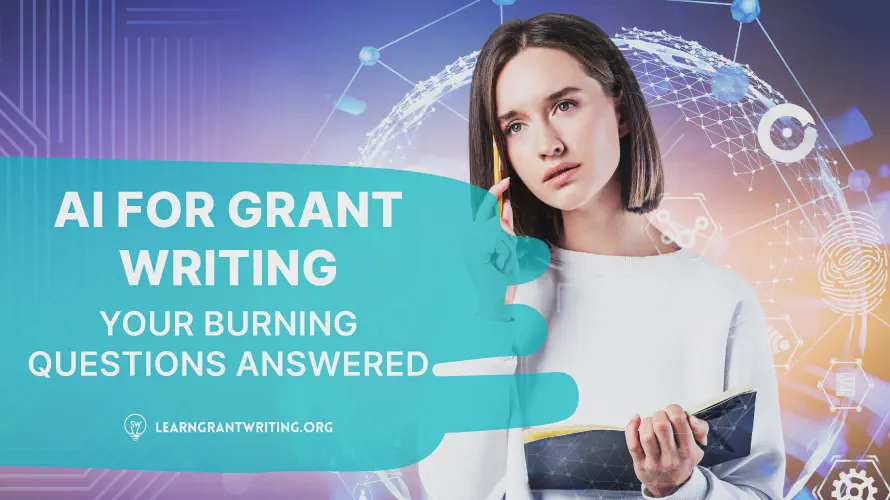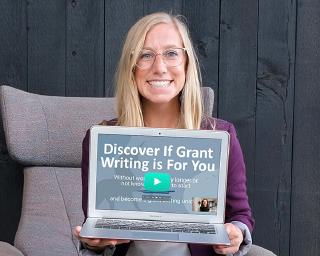Welcome to the new frontier for grant writers. Artificial intelligence (AI) tech is already changing the game and reshaping the field of grant writing.
What's all the buzz about? Our team in the Global Grant Writers Collective dove in head first to see for ourselves. We tested tools and even built one from the ground up (jump ahead to take a look). The results have been amazing.
Our technology partners who helped build our AI grant writing software tried it out, too. They earned $1 million in revenue with NO grant writing experience.
🚨 Wait, what? Does this mean AI will take your job? Or that anyone can do this?
- Might look like it, but no! There's a lot of AI anxiety out there—don't fall for it. You can and will succeed in the new era of grant writing if you adapt. Here's what you'll need:
- Grant writing know-how and support (from trusted experts like us 😉)
- Working knowledge of AI and how to use it for grant writing (you're in the right place!)
Quality AI tools designed specifically by and for grant writers (spoiler alert - we've got you covered)
We've hit all the AI roadblocks so you don't have to, and we're ready to share what we've learned.
🤖 Read on to start building your grant writing future! 🚀
Louder again for the people in the back: We're a long way from robots taking over our jobs as grant writers, but grant writers using AI will.
Discover Grant Writing as a Career
If you’re interested in becoming a grant writing consultant, check out this free training on how you can pull off a meaningful career change.
Access Free Class
Quick Answers: What is AI?
First, a little context. With a whole lot of jargon floating around, let's bring these AI concepts down to earth.
⭐ What is AI?
Technically put, artificial intelligence (AI) is the approximate replication of human thought processes or "intelligence" by machines. AI also generally refers to the field of researching and developing this kind of technology.
These thought processes involve identifying patterns in data (usually huge sets of it) to find connections and using them to make inferences.
AI is like an echo in a mountain. When you shout something to a mountain, the echo repeats what you said. If a group of people shouts to a mountain, the echo will sound kind of like a combination of those sounds. AI similarly repeats, uses, and combines the information it gets, just like an echo uses the sound of your voice.
⭐ What is machine learning?
Machine learning (ML), is the pattern identification process that powers AI technology.
AI systems scour data for connections and patterns. They then "learn" from these patterns to judge probability and make inferences, loosely similar to the human decision-making process. ML systems can retain their correct inferences to inform future outputs, basically learning from their mistakes and improving their "understanding" of different connections.
Think of it like this: Your favorite video game or phone app gets harder as you get better at it. Just like when you play a game that adjusts to challenge your current skill level, ML systems learn from what happens and try to become better at their tasks.
Part of what sets an ML process apart from human learning is its scale. AI systems trained on large datasets can process tons more information than human brains, hence all the buzz around the potential this technology has to change the way work is done.
⭐ How do AI chatbots work?
AI chatbots like ChatGPT are large language models (LLMs). These are a type of AI system specifically built to analyze and generate text.
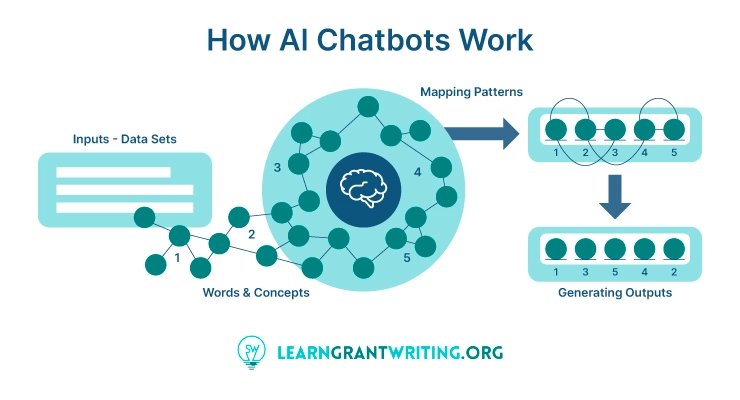
These models are trained with large sets of data and written content to find patterns between words, phrases, concepts, and how they're arranged together. Then, LLMs "learn" from those patterns to generate written outputs. When an LLM generates a written response, it's predicting that those words fit together and answer your query based on everything it's "learned."
Think of it like a vast recipe book that contains every recipe ever written—every dish, every dessert, every seasoning tip.
Now, let's say you're trying to decide what to make for dinner, but you're not quite sure of the steps or ingredients. You ask this book, and because it has so much knowledge from all these recipes, it helps you figure out the best recipe based on what you like or what ingredients you have.
Instead of just recipes, LLMs contain words, sentences, and information from millions of books, articles, and the internet. When you ask it a question, it looks through all it has learned to help give you the best answer. This process is called natural language processing (NLP), a type of machine learning.
⭐ What are the types of AI you might encounter in grant writing?
As a grant writer (or most other kinds of professionals these days), you'll encounter different types of AI technology. These tools fall into two general categories based on how they're used and what kind of outputs they provide:
Generative AI. These tools generate written answers to queries (and now visuals, too). They take the form of LLMs. They can be trained on very broad sets of data to respond to practically any query or on smaller sets of data to serve more specific purposes, like our grant writing AI tool.
Examples: ChatGPT is the most famous generative AI tool today, but you've used plenty of others without knowing it. Think of chatbots on websites or other virtual assistants. Netflix, Spotify, and YouTube suggestions—yup, those are aspects of generative AI, too.
- Predictive AI. These AI systems are designed specifically for analyzing data to generate predictions based on the patterns in it. While generative AI does something similar by treating language as data, these are data-first tools that provide data-based responses. For example, many nonprofits today use AI systems to rank donors by their likelihood to give based on a range of prospect research data points.
- Examples: Think of your weather apps, stock market apps, or traffic apps like Waze. Even Google Maps analyzes the current traffic as data to predict your time of arrival. Pretty handy, right?
How Can You Use AI for Grant Writing?
AI can be immensely helpful for grant writers. Consider these use cases during different stages of the grant writing process (and imagine how much time you could save when you sit down to tackle them):
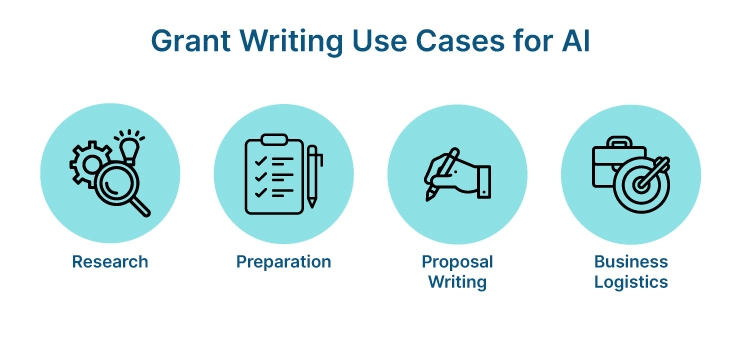
Grant Research
Predictive AI algorithms can help you identify the most viable opportunities to pursue based on various known factors like past funding, approximated competitiveness, mission alignment, and more insights available in grant databases.
Grant Preparation
Use generative AI tools to create project summaries and organizational background materials using the details you provide. Spend just a fraction of the time refining and polishing them. The right approach could help you generate the entire narrative skeleton of your grant in just minutes!
Proposal Writing
Get your grant writing questions answered by AI chatbots trained on relevant content, generate language for the proposal, and save time (which you can put back into taking your proposal to the next level with compelling details).
Business Logistics for Freelancers
For freelance grant writers, use AI tech to generate client onboarding materials and contracts. Some tools might even help you source new clients by exploring connections in your network between organizations and funders through mission alignment, location, specialties, etc.
Of course, exact functionalities will vary greatly from one AI platform to another. If you invest in any new AI tools for your organization or freelancing business, first think about your biggest pain points. Where would automation help? Prioritize these possible improvements and use them to guide your search for new additions to your toolkit.
Is Grant Writing For You?
If you are looking for a career change and interested in grant writing consulting, check out this training on how to get started. Build a flexible life you love!
Watch Video
What are the Benefits of Using AI for Grant Writing?
Even though the technology is complex, the primary benefit of using AI to support grant writing is very simple: It saves you a ton of time.
Whether you ask an AI chatbot for fast answers or generate starter text for sections of a project brief for a client, AI equals efficiency. Full stop.
Let the AI tools do the heavy lifting so you can skip the writer's block and stay in your zone of genius, adding the human touch. AI tools write drafts. Grant writers turn them into winning proposals by understanding the context and adding more compelling details.
Under this efficiency umbrella, AI brings more specific benefits depending on how it's used, including:
- Solving the blank page problem and writer's block
- Revealing new insights and connections that you might miss.
- Analyzing provided data (like funder reports or 990s) to provide quick summaries and highlight notable trends.
- Making boring tasks less boring—let AI handle things like drafting contracts and organizational background sections.
From one grant writer to another, I'm telling you that you are going to put out higher-quality work when you rapidly uplevel your efficiency. Increased efficiency means higher-quality work leading to more funding for organizations.
Get more done in smarter ways, and you get to focus on bringing the sparkle. You get to win more funding overall because you'll have more time in a deep workspace to bring the magic. More funding for organizations means a radical impact on communities and greater financial freedom for grant writers. Using AI effectively is a win-win-win for the world.
When nonprofits and consultants lean into these changes with curiosity, they change the game. We've got the perfect tool to help you get started—check it out.
Potential Drawbacks: Is AI Safe to Use for Grant Writing?
Of course, any new technology brings some risks, especially in the early days of its adoption. We're guessing the first person to ride a horse (or unicorn 🦄) probably learned how to do it the hard way.
The risks and potential drawbacks of artificial intelligence have been discussed a lot, so you're probably aware of several of them. However, it's crucial to understand these possibilities so you can 1) find trustworthy tools and 2) ethically deploy them with real nonprofits.
These are the three biggest concerns to keep in mind:
1. Generic or Incorrect Answers
It's well known at this point that general AI tools like ChatGPT can generate pretty blah (or even completely made-up) answers to queries. Its writing style is already fairly recognizable, too.
This means that some AI tools may inadvertently take more of your time to use effectively. They might require you to manually tinker with the prompts, refine the generated language, and check for accuracy. In many situations, this defeats the whole purpose of AI, making it not worth the time to use when you could do tasks manually the old-fashioned way.
🚀 The Solution:
Use an expert-crafted grant writing tool built for the purpose of grant writing. Systems trained specifically on material about grant writing will be much more likely to give you the reliable, consistent outputs you need to make them truly useful.
2. Privacy Risks
The outputs of LLMs are typically used to continually retrain them—hence the learning part of machine learning. But when these tools are publicly (or just broadly) available for use, this can create security and privacy risks. Sensitive information might get added back to the big pot of data that's mixed up and served to other users.
Nonprofits and anyone working on their behalf must be mindful of these concerns and avoid sharing potentially sensitive information with LLMs if appropriate safeguards aren't in place. Failing to protect your organization's, donors', clients', or their donors' information can bring reputational (and maybe even legal) damage.
AI has also triggered several copyright battles, which might be a concern for some organizations.
🚀 The Solution:
Use AI tools that store information completely in closed private systems. Some AI platforms train private, personalized algorithms for each user, meaning they don't return any outputs to be inadvertently shared with others
📣 In the grant writing space, our solution is currently the only one that provides complete algorithmic privacy. 📣
3. Job Security: Will AI Take My Job?
No way around it, the rise of AI has unleashed a lot of anxiety about the possibility of it replacing human workers in many industries.
Will AI take your job as a grant writer? No. But a grant writer using AI will.
We know firsthand. We've been quietly building a grant writing consulting business with our new AI grant writing software, so we've seen exactly where and how the technology falls short.
A human touch is still very strongly needed for the relationship building and communication that only a human can do right now. Only you have the context, judgment, and common sense to handle some details like attachments, program design, project management, and more.
However, knowing how to use AI tools will quickly become an industry standard for driving maximum impact. Remember, the name of the game is efficiency. Plus, with the rise of grant writing-specific AI tools like ours, you don't even need to become a prompt engineering expert—we've already done it for you.
🚀 The Solution:
Dip your toes into the world of AI grant writing soon. Explore the options already available to you (like as a Learn Grant Writing Collective member). No need to be afraid of a new tool, especially one that could transform your career!
So is ChatGPT even helpful for grant writing?
You're probably wondering if ChatGPT, the world's buzziest generative AI tool, is a good choice to help with your grant writing projects.
No, it's not.
Especially when grant writing-specific alternatives are out there to use instead (like ours).
Many of us have already experienced this weird contradiction: AI has huge potential and is a majorly disruptive force. But when you use ChatGPT, you often get long-winded, fluffy replies. They're not in your writing style. They're often incorrect or too vague to be immediately helpful.
You end up spending much longer to spruce up ChatGPT's responses than you'd spend doing the work yourself. Not to mention you've got to worry about privacy risks, too,
The fact is, the reality of these broad generative AI tools just hasn't caught up to the potential, and it won't for a while. You need something more specific and that was designed by experts.
Introducing Unicorn Copilot, Your Ultimate AI Grant Writing Buddy
Want a grant writing AI solution that gets the job done with accurate grant writing terminology and top-notch privacy? So did we.
Introducing Unicorn Copilot, Learn Grant Writing's game-changing AI assistant designed by and for professional grant writers.
A Little Background
The Global Grant Writers Collective has already empowered grant writers to raise more than $637 million for nonprofits. Some of our members are headed toward $1 million in revenue as freelancers! Check out their wins to see for yourself.
But that's not enough. The Learn Grant Writing team knew we had to kick it up a notch to keep growing right along with our talented community of grant writing unicorns.
The answer: A ground-up, purpose-built, highly secure AI solution designed specifically for their needs.
With this new tool for Collective members, our goals are to help grant writers:
- Secure more paying client work
- Produce better work
- Win more grants
- Buy back time so they can live a life they love
We realized we already have the best possible asset to help build this tool—the treasure trove of grant writing guides, videos, and expert answers in the Global Grant Writers Collective. There's nothing else like this wealth of information in the grant writing world, and it's allowed us to build a completely unique, expert-informed AI platform.
Check out why we're so buzzed about this new AI tool:
How Our AI Grant Writing Tool Stands Out
It's smart. | Unicorn Copilot is trained with our extensive (and exclusive) collection of expert grant writing resources. |
It's purpose-built. | Our tool was developed jointly by both AI and grant writing experts—no general solutions or vague ChatGPT answers here! |
It's secure and private. | All data is stored within each user's instance of the tool, not added to a mass of shared information. This is completely unique to our grant writing platform. |
It's accessible. | Unicorn Copilot is an easy (and affordable) add-on for Global Grant Writing Collective Members, while other solutions charge up to $2k/month—definitely not a realistic price for most nonprofits or freelancers. |
How Collective Members Are Using Unicorn Copilot
How are real grant writers already using this tool to work faster and better? Check out these use cases:
- Project onboarding. Use our Project Planning Toolkit and Power Prospectus to hit the ground running with new grants quickly. Deliver a narrative skeleton for your grant in a fraction of the time it used to take.
- Preparing for informational interviews. Make the most of your time with potential grant writing clients by preparing with AI-driven analyses and summaries.
- Contract generation. Dramatically streamline this time-sucking logistical task that trips up so many new grant writers.
- Generate and improve Funding Strategies. Generate overviews and memos for proposed funding strategies to lay out a long-term plan (and secure more work).
- 24/7 answers and resources. We also offer an expert grant writing chatbot, Sparkles the Unicorn. Get immediate answers to your questions and let Sparkles point you straight to the source—she'll be your new best friend 🦄
To get started, tell Unicorn Copilot a bit about yourself, your grant writing practice, and your writing style:
From here, your personal grant writing Copilot will kick into gear. Use it to launch your next grant writing project, build a Funding Strategy, prepare for a kickoff meeting with a client, whatever you need!
By providing Unicorn Copilot with a few details, it can generate memos and strategy outlines for you in minutes:
Want an even deeper dive into why we created Unicorn Copilot? See what's happening inside the Global Grant Writers Collective:
Success Stories from Collective Members
One Collective member, Courtney, was preparing to work with a new client. She plugged past grant proposals for the client's program into Unicorn Copilot and reviewed outputs. The result? Drastically simplified meeting prep with a clear vision, summaries about the program, its recent changes, and current needs.
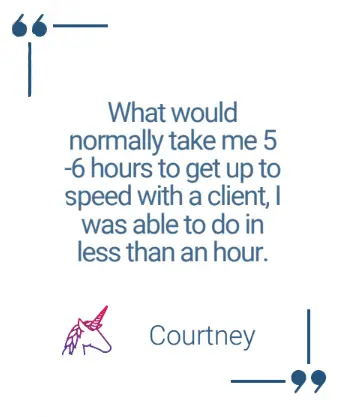
From a six-hour task down to less than an hour. Wow.
What happened next? Courtney quit her 9-5 job in May and by June had replaced her monthly income with grant writing gigs. After six months, she'd done $100k in business—a success that she attributes to AI Copilot helping her dramatically scale and streamline her work.
This is the core value of AI for grant writing professionals—quickly cut through the clutter and background to get to the meat and potatoes of the work.
Now, multiply these time-savings across all your work and you're looking at some serious efficiency. With more time to put into quality, impact, and connection-building instead of logistics, you'll be an unstoppable grant writing force.
Join the Community and the New Frontier of Grant Writing!
Save time, work smarter, impress clients, and drive more impact for nonprofits in your community. The world's at your fingertips, and Unicorn Copilot is here to help!
The co-designers behind this tool, BeDA, are charging $2k a month for this tool, but members of the Global Grant Writers Collective get an exclusive discounted rate. Perks of being in on the ground floor. 😉
Not yet a Collective member? Learn more about our exclusive community for grant writers of all skill levels to learn, practice, and thrive together.
We're proud to be early adopters of new technology that will take our members further than ever before. AI technology is changing how work is done, grant writing included, and we're excited to have you onboard.
To learn more about grant writing, how to win more grants, or even launch your own freelance career, follow us on YouTube or keep exploring these resources from our team:
- Grant Writing 101: What is it & how do you get started?
- How to Write a Grant Proposal: 7-Step System & Bonus Tips
- Freelance Grant Writing: How to Start Strong & Succeed
- Can I Make Money as a Grant Writer?
Want to Know What AI Can and Can't Do for You?
How to train your AI to write better drafts
